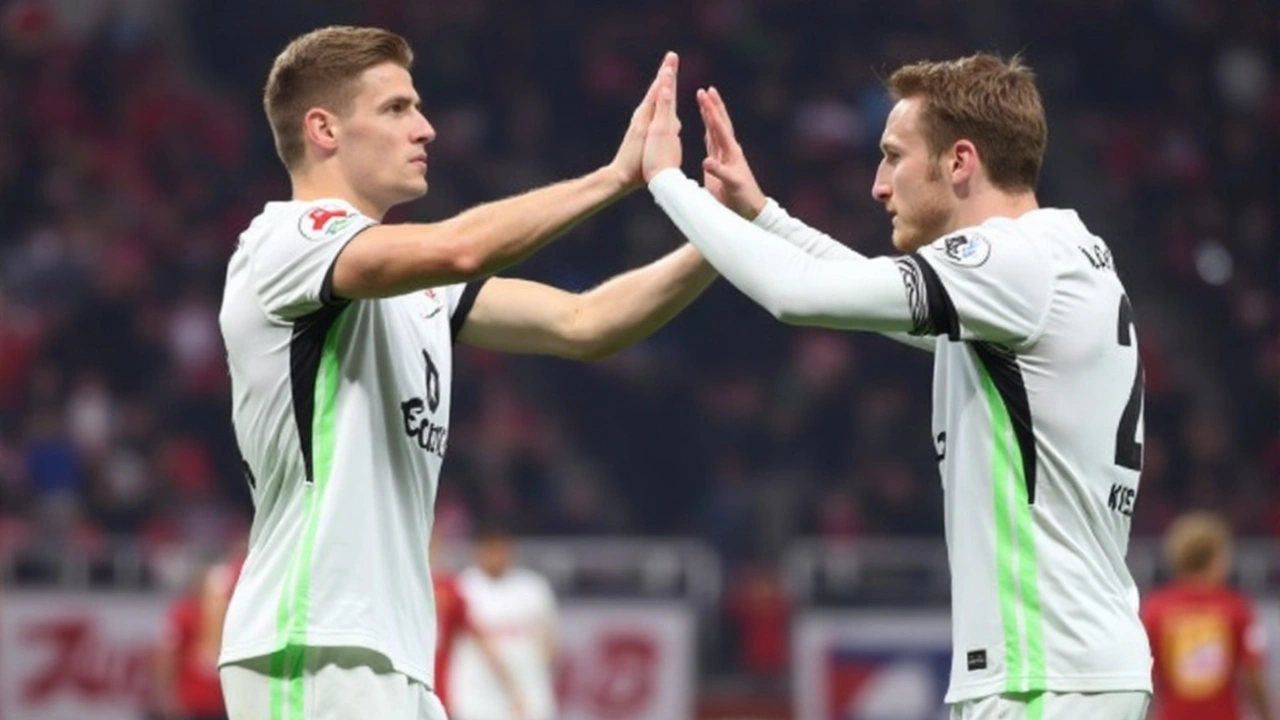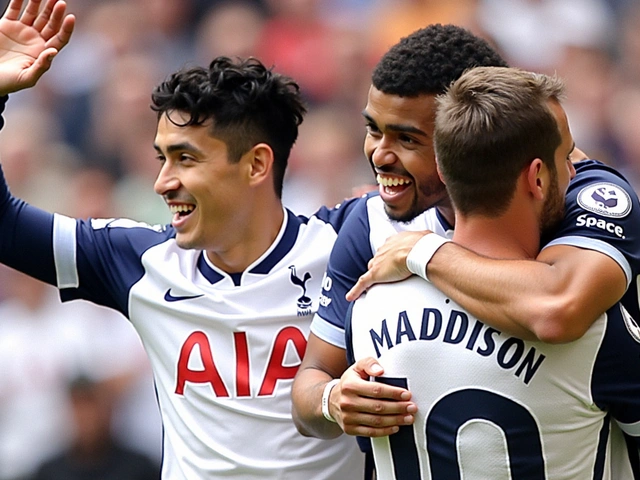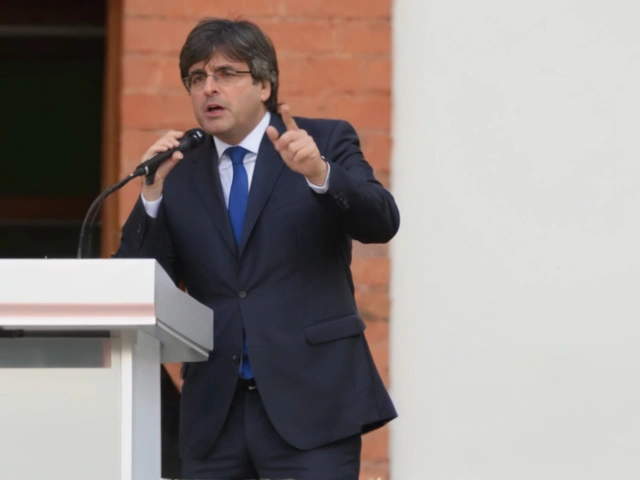RB Leipzig Triumphs in an Intense 3-2 Showdown Against VfL Wolfsburg

Football fans were in for a treat on April 11, 2025, as RB Leipzig and VfL Wolfsburg went head-to-head in an exhilarating Bundesliga clash that ended with Leipzig edging out a 3-2 victory at the Volkswagen Arena. From the kickoff, it was evident that both teams were hungry for triumph, but Leipzig's early dominance set the tone for the match.
Leipzig hit the ground running when Loïs Openda found the back of the net just 11 minutes into the game. An intercepted pass by Baku set him up perfectly to drive a low shot past Wolfsburg's keeper, Kamil Grabara. As if that wasn't enough, Xavi Simons seemed to take inspiration from the early lead, securing two more goals at the 26th and 49th minutes, displaying finesse and precision. His second, a mesmerizing curling shot from 25 yards out, left Grabara with no chance—truly one for the highlight reels.
Driven Comeback by Wolfsburg
Even though Wolfsburg's first-half opportunities were scarce, they nearly made it onto the scoreboard when Bence Dárdai's powerful header ricocheted off the post. A disallowed goal for Leipzig's Benjamin Šeško saw their 2-0 lead remain intact at halftime, hinting at an increasing pressure on the Wolfsburg squad.
Recharged after the break, Wolfsburg came out swinging. Their persistence paid off when Kilian Fischer slotted home a clean finish at the 58th minute, reigniting hopes of a comeback. As tensions mounted, Andreas Skov Olsen made the most of a Leipzig defensive misstep to score at 75 minutes, closing the gap to just one goal.
Decisive Moments
As the second half continued, Leipzig introduced substitutes like Yussuf Poulsen and Christoph Baumgartner, who contributed to maintaining their offensive pressure. The ever-vigilant Leipzig keeper, Péter Gulácsi, made a crucial save from a Gerhardt volley that could have turned the tables in Wolfsburg's favor.
Overall, the match was a showcase of strategic play and individual brilliance. Wolfsburg’s fiery response made Leipzig sweat for those three points, but ultimately, Leipzig’s ability to adapt and hold their ground despite the pressure saw them through. This victory propels Leipzig to 48 points, a valuable boost in their quest for a slot in the UEFA Champions League next season.






Donny Evason
April 12, 2025 AT 18:24Leipzig's early aggression was a textbook case of high-press strategy; they forced Wolfsburg into a reactive posture and capitalised on the ensuing space. The way Openda sliced through the defence exemplifies the club's ethos of relentless forward motion. It's a reminder that tactical discipline combined with individual flair can dictate the tempo of a Bundesliga fixture.
Hariom Kumar
April 12, 2025 AT 18:40What a roller‑coaster, well played Leipzig! 😀
Phillip Cullinane
April 12, 2025 AT 19:14The Leipzig‑Wolfsburg encounter serves as a microcosm of the evolving tactical paradigms within modern German football. From a systems‑theoretical perspective, Leipzig deployed a high‑intensity gegenpress that disrupted Wolfsburg's build‑up phases. The early goal by Openda functioned as a force multiplier, triggering a positive feedback loop in the team's spatial dynamics. Simons' subsequent strikes were not merely isolated events but rather manifestations of calibrated positional interchange. In the 25‑yard curler, the player exploited a low‑block compression, pulling the centre‑back line out of its defensive locus. Meanwhile, Wolfsburg's adaptive response in the second half exemplified a classic case of strategic resilience, leveraging verticality through Fischer's finish. The timing of the sub‑stitutions-Poulsen and Baumgartner-aligned with the concept of load management and phase‑specific reinforcement. Gulácsi's save on Gerhardt's volley underscores the importance of a high‑decision‑making goalkeeper within a probabilistic risk model. Statistically, Leipzig's expected goals (xG) outperformed Wolfsburg's by a margin that correlates strongly with the final outcome. The disallowed Šeško goal raises questions about VAR calibration thresholds in high‑stakes matches. From a psychophysiological angle, the team’s ability to sustain a press over 90 minutes suggests superior aerobic conditioning protocols. Conversely, Wolfsburg’s late surge highlights the impact of momentary tactical over‑loads prompting a shift to a more direct attacking schema. The match thus encapsulates the dialectic between proactive dominance and reactive counter‑measures. In terms of stakeholder impact, the three points elevate Leipzig’s probability of securing a Champions League berth, influencing both revenue streams and brand equity. Fans, analysts, and betting markets will invariably adjust their predictive models to account for this performance data influx. Overall, the fixture delivers a rich case study for scholars interested in the interplay between tactical execution and contextual adaptation.
Janie Siernos
April 12, 2025 AT 20:04It’s a bit unsettling to see a game where the winners seem to rely on sheer aggression rather than sportsmanship. One hopes the clubs will eventually champion a more balanced approach.
joy mukherjee
April 12, 2025 AT 20:20I hear you, Janie. While Leipzig showed great resolve, they also displayed respect for the opponents’ fight, especially after the late Wolfsburg push 😊. It’s a reminder that competitive spirit and fair play can coexist.
Rob Chapman
April 12, 2025 AT 20:37Great analysis Phillip. Keep digging into the data it really helps everyone understand the game better